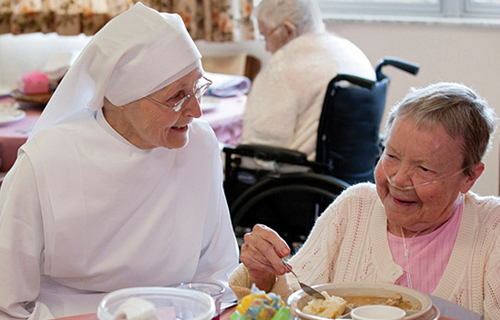Little Sisters Vow to Continue to Follow Consciences After Court Rules Against Them in Mandate Case
The 10th Circuit Court said the religious order failed to show that the HHS mandate required a substantial burden on their free exercise of religion.

DENVER — The Little Sisters of the Poor have reiterated their commitment to following their consciences as they care for the poor and dying, following a federal appeals court ruling that they must obey the federal contraception mandate.
“As Little Sisters of the Poor, we simply cannot choose between our care for the elderly poor and our faith,” said Sister Loraine Marie Maguire, mother provincial.
“And we should not have to make that choice, because it violates our nation’s commitment to ensuring that people from diverse faiths can freely follow God’s calling in their lives. For over 175 years, we have served the neediest in society with love and dignity. All we ask is to be able to continue our religious vocation free from government intrusion.”
Sister Loraine responded to a 10th Circuit Court of Appeals ruling against the Little Sisters of the Poor on July 14.
The sisters are among several hundred plaintiffs that have challenged the federal contraception mandate, which requires employers to offer health-insurance plans covering contraception, sterilization and some drugs that can cause early abortions.
Employers who fail to comply with the mandate face crippling penalties. In the case of the Little Sisters, the fines could amount to around $2.5 million a year, or about 40% of the $6 million the Sisters beg for annually to run their ministry.
Met with a wave of protest, the contraception mandate has undergone a number of revisions. However, the sisters say that it still requires them to violate their beliefs.
Because the Little Sisters of the Poor are not affiliated with a particular house of worship, they do not qualify for the religious exemption to the mandate. The federal government has argued that it has sufficiently provided for the religious freedom of the Little Sisters and other religious organizations through an “accommodation,” under which the faith-based employers can pass the burden of providing the objectionable coverage to insurers, who must then offer it directly to employees without cost.
The government says that providing contraception coverage is ultimately free for insurance companies, because birth control results in better health for women and lower pregnancy rates, resulting in lower overall costs for insurers.
Critics, however, reject this claim, arguing that the costs of the coverage will ultimately be handed on to the employer in some way. Several religious organizations have also said that they still object to signing a form that passes the burden of providing the objectionable content to another party.
The 10th Circuit Court ruled that because the Little Sisters had the option of signing the form, they failed to show that the mandate required a substantial burden on their free exercise of religion.
Last year, the Little Sisters received temporary protection from the mandate under two orders from the U.S. Supreme Court: one order from the full court and the other from Justice Sonia Sotomayor, who oversees the section of the country where the sisters’ case originated. The orders had protected the Little Sisters from mandate penalties while their case was working its way through the court system.
The Supreme Court has also ruled directly on the mandate. In June 2014, it struck down the mandate as it applied to Hobby Lobby and other closely held for-profit companies.
In its July 14 decision, the 10th Circuit said that the Hobby Lobby case reasoning did not apply in the Little Sisters’ case because they were a nonprofit and therefore fell under the terms of the “accommodation,” which were not offered to Hobby Lobby as a for-profit company.
The 10th Circuit’s order also applies to Christian Brothers Services and Christian Brothers Employee Benefit Trust, the Catholic organizations through which the Little Sisters obtain their health coverage.
“We’re disappointed with today’s decision,” said Mark Rienzi, senior counsel of the Becket Fund for Religious Liberty, which is helping to defend the Little Sisters in court.
“After losing repeatedly at the Supreme Court, the government continues its unrelenting pursuit of the Little Sisters of the Poor,” he continued. “It is a national embarrassment that the world’s most powerful government insists that, instead of providing contraceptives through its own existing exchanges and programs, it must crush the Little Sisters’ faith and force them to participate.”
“Untold millions of people have managed to get contraceptives without involving nuns, and there is no reason the government cannot run its programs without hijacking the Little Sisters and their health plan,” Rienzi said.
The Becket Fund said that the Little Sisters and their attorneys are looking into the possibility of appealing the ruling to the Supreme Court.
- Keywords:
- conscience rights
- free exercise of religion
- hhs mandate
- little sisters of the poor
- religious freedom

















